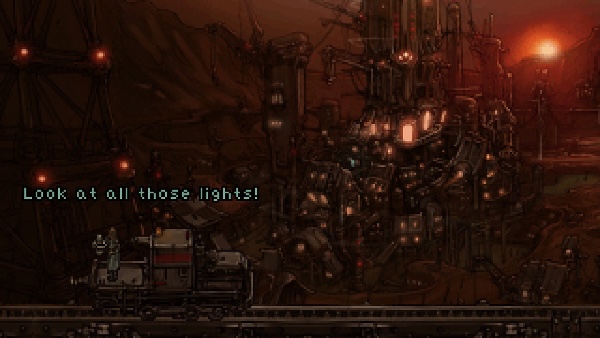
Review Fix chats Primordia designer and writer Mark Yohalem to find out what inspired the game and much more.
About Primordia:
When humans are extinct, the robots we built will outlive us — but they’ll need power to survive.
This is the quandary facing Horatio Nullbuilt, a stoic android who would be content to spend his days in the junkyard he calls home, sparring with his sarcastic sidekick Crispin and ruminating on the teachings in the Book of Man.
With his power source running out, Horatio must travel to Metropol, the city of glass and light. And when he gets there, he’ll find that everything he thought he understood is not what it seems.
Review Fix: How was this game born?
Mark Yohalem: Victor Pflug began creating a wasteland world of robots, and invited me to give it a history, a narrative, characters, etc. Together, along with programmer James Spanos, we built the game, with plenty of help from voice actors, composer Nathan Chambers, and Wadjet Eye Games as publisher.
Review Fix: What is your role in the game?
Mark: I was the writer and designer, and I also did a lot of the testing and testing oversight. Along with James I’ve done a lot of the player support and community building aspects.
Review Fix: What was the port process like to Switch?
Mark: James worked like the brilliant polymath he is, and found a way to translate the game brilliantly to the new system. With that same know-how, he’s now helping port the rest of Wadjet Eye’s catalogue.
Review Fix: What has development been like? How was PC dev different?
Mark: Nintendo exercises a much tighter control over the process, which made it a little less organic going from building to release. Unlike with a PC, we also had to secure a devkit. It’s the classic open platform/walled garden difference.

Review Fix: What makes this game special?
Mark: The game is woven from the fond childhood memories the three of us had growing up with adventure games, the dreams we had of making our own adventures, our fears, and passions, and curiosities. It has an authentic, independent voice, and what it has to say resonated with a huge number of players. Almost daily we get emails, tweets, messages, reviews, etc. from players about the impact the game had on them, and many of these messages are very personal and emotional. Primordia is framed as a game about robots, but it is really a game about humanity and humanism.
Review Fix: What games influenced this one the most?
Mark: Art-wise, I believe Victor was most influenced by Beneath a Steel Sky. Narrative-wise, I was most influenced by Planescape: Torment and, in its own way, Loom.
Review Fix: Any fun stories or wild moments during development?
Mark: Many nervous breakdowns. Development is less about fun and more about hard work, despair, and the terror of putting a part of yourself out into the world.
Review Fix: What were the major lessons learned?
Mark: Love your team, your game, and your players. Love is the only way to survive the hell-terrors of development.
Review Fix: How does it feel to be on a Nintendo console?
Mark: Amazing. The first video games I played were on an NES. Watching my daughters play Primordia on a Switch, there was a disorientating sense of circularity but also breaking out of an orbit I’d been on since childhood.
Review Fix: Do you think preserving older gameplay mechanics in new games is important?
Mark: I have a strong presumption that preserving the knowledge, arts, and skills of the past is always worthwhile. But, for instance, do I think gamers today should have to learn how to free up conventional memory and get IRQ and DMA settings right? No. Some gameplay conventions are closer to fiddling with DOS Sound Blaster settings than they are to actually engaging with a game. UIs have improved a lot, for instance. But smoother isn’t always better, so I think at a minimum designers should consciously consider what they are eschewing when they leave out older gameplay mechanics.
Review Fix: The marketplace is crowded. How do you think you stand out?
Mark: We treat our players with love and respect commensurate to the time, attention, hopes, and money they put into our games. Also, Vic’s artwork is out of this world.
Review Fix: How have your previous experiences in industry helped this game?
Mark: Yes. I could not have made Primordia without first learning from folks at TimeGate, Bioware, and elsewhere. But one important thing I learned was the need to speak with my own voice rather than trying to chase an impression of what the market wants.
Review Fix: How do you want this game to ultimately be remembered?
Mark: For its humanism.
Review Fix: What’s next?
Mark: We released our second adventure, Strangeland, last May. Next up are two RPGs. I’ve been working on one, Fallen Gods, for about a decade. Vic has been working on his own, Hibernaculum, for a few months.
Review Fix: Anything else you’d like to add?
Mark: We appreciate you giving Primordia coverage. Just as with players, we’re grateful for the time, attention, and care that video game websites put into our creations. You could fill your whole life playing great games and never spend a second on what we’ve made, so we feel lucky that you picked us out of the bunch.


Leave a Reply